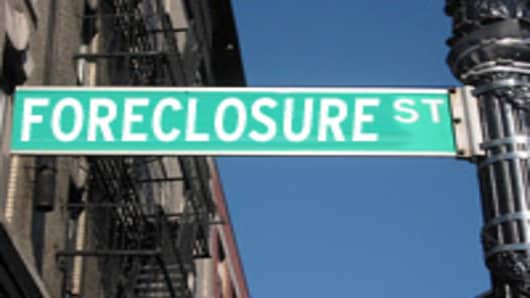Having already passed one piece of legislation to rescue the housing sector, the government appears ready to embrace a bigger and more costly plan, hot on the heels of its historic efforts to bail out financial firms.
"There's a sense that if we don't do something about housing, we will end up throwing good money after bad," says Christopher Mayer, senior vice dean and professor of real estate at the Columbia Business School.
The push for another housing rescue plan comes amid growing calls for a second economic stimulus package. Federal Reserve Chairman Ben Bernanke backed the idea during his testimony before Congress on Monday, and President Bush signaled he's "open to the idea."
But economists say the best bang for the buck will come from helping housing, not another tax cut or extended unemployment benefits. That's because home prices, much like stock prices, fundamentally affect people's sense of wealth
"We can't stop them from falling," says Mayer. "What we're trying to do is prevent them from collapsing."
Mayer is among those who expect home prices to fall another 15 percent in the next 18 months, on top of their 15-20 percent decline.
"Banks are not lending out much of that money in part because they are anticipating more losses on their balance sheets," he adds. "You could easily see billions more in write-offs."
At the moment, there's no shortage of proposals to jumpstart the housing sector, from the presidential candidates to Congress to the trade groups.
And whatever that is, it has to be done relatively quickly and be in place for the traditional spring housing season. One big question then is whether it becomes the job of a lame duck Congress and president or a the new government in late January.
Any new plan will also have to be more well-received and highly regarded, unlike its predecessor, the Hope for Homeowners mortgage modification program of last July, which now seems hastily conceived, poorly received and otherwise forgotten or written off by most in Washington.
"We need to drive activity to banks, so [interest] rates will come down," says Mary Trupo, who follows policy for the National Association of Realtors. "The unforeseen consequences of all this legislation is that mortgage rates have increased."
Indeed, rates on 30-year mortgages—which have hovered between 5.75 percent and 6.25 percent in recent months— are higher than they were at the beginning of the year when the Federal Reserve began to aggressively trim interest rates.
The NAR's plan is more modest than most, and tweaks existing measures, such as tax credits for homebuyers and higher borrowing limits for conforming loans, the latter of which are now slated to expire at the end of this year.
"We'd like to see it as simple and uncomplicated as possible," says Trupo.
By contrast, the plan of Democratic presidential nominee Sen. Barack Obama is multi-faceted and somewhat similar to the existing plan. So are the proposals of Sen. Hillary Clinton. The plan of GOP rival Sen. John McCain, though simpler, is also considered cumbersome and slow.
Top Regulator: Government Not Doing Enough About Foreclosures
A key concept of those plans—and virtually every other—is the refinancing of the original mortgage with better borrowing terms to avoid foreclosure. A key variable is the extent to which the lender, borrower or both have to contribute. In most cases, the government would provide some kind of guarantee or taxpayers would eat some of the loss.
"We can't only help distressed homeowners," says Columbia's Mayer. "We need to help ordinary people, such as first-time buyers, those trading up. We have to generate new and normal business."
Under the plan Mayer is finalizing, some 19-20 million mortgages would be refinanced at 5 1/4 percent for 30 years.
On average, borrowers would save about $350-$400 a month in principal and interest, lowering total borrowing costs some $7-$8 billion a month and creating a fiscal stimulus of $90-$100 billion a year. In the process, a substantial amount of existing mortgage-backed securities would be repaid.
"I think lenders would work with a government program," says former FDIC Chairman William Isaac, adding that enough hasn't been done for the housing sector.
Though debate has yet to be translated into legislation, there's a growing acceptance that the banking and housing crises are intricately connected and that a so-called consumer bailout is more than populist, me-too politics.
In his testimony Monday, Fed Chairman Bernanke said the housing market is depressed. Even Treasury Secretary Henry Paulson, who has directed virtually all of his rescue efforts at the financial firms themselves, emphasized the need for banks to avert foreclosures in his comments Monday on the government recapitalization plan.
In a recent speech, Boston Federal Reserve President Eric Rosengren emphasized the need to boost home values and market sentiment.
"Individuals shopping for homes need to be confident that appropriate financing is available. Individuals need to be more confident in housing transactions proceeding normally," Rosengren said. "And individuals need to feel that there is potential for housing prices to rise."
A housing rescue plan, like most of the government's recent interventionist measures, is not without questions or critics.
"It's going to a lot messier than they think it is," says Alan Reynolds of the Cato Institute.
The AEI's Alex Pollock, whom Congress consulted with on the Hope for Homeowner program, says its only real shortcoming is that it guarantees the loans but does not fund them.
"I guess the next link is funding loans," says Pollock, a former CE0 of the Home Loan Bank of Chicago. He says that could probably be accomplished through the Treasury's reverse auction facility.
Even supporters say any package will have limited impact.
"I don't think you're going to see commercial banks wanting to load up on a lot of housing loans," says Isaac. "They didn't want to do that during the best of times."





